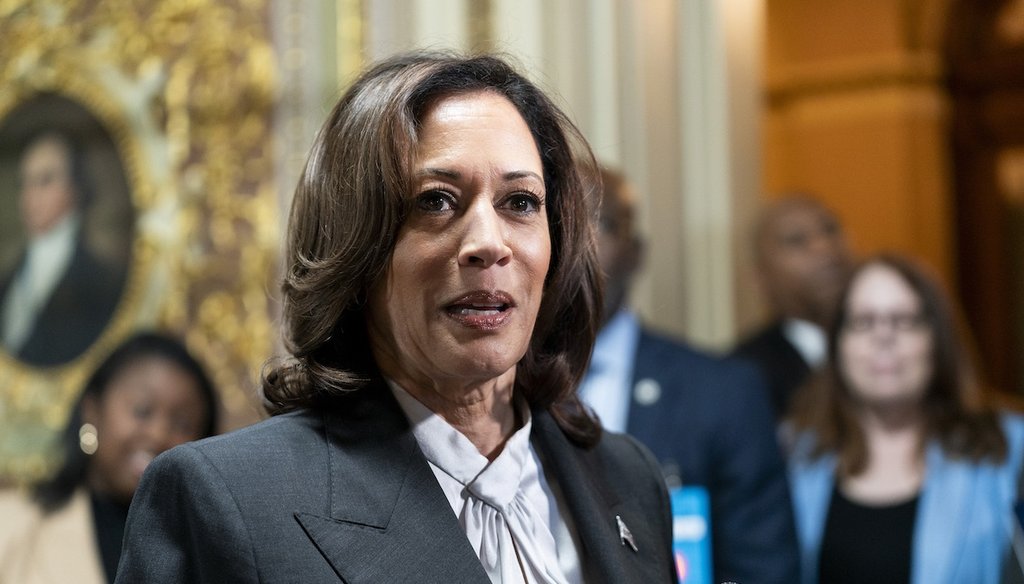Stand up for the facts!
Our only agenda is to publish the truth so you can be an informed participant in democracy.
We need your help.
I would like to contribute

Vice President Kamala Harris speaks to the press Oct. 3, 2023, at the Capitol. (AP)
Do Biden’s policies get the credit for the decline in inflation, as Kamala Harris said?
If Your Time is short
-
Inflation has fallen since mid-2022 on President Joe Biden’s watch, and some of his policies may have helped on the margins, economists say.
-
However, the biggest reason for the disinflationary pattern has been something the administration doesn’t control: interest rate hikes by the Federal Reserve.
-
A decline in oil prices and a slowdown in China’s economy, which the administration can’t control, either, have helped, too, economists say.
Americans have soured on the economy, partly because of unusually high inflation under President Joe Biden. Vice President Kamala Harris tried to change that perception on CBS’ "60 Minutes."
During an Oct. 29 interview, Harris said Biden came into office during the coronavirus pandemic, but "because of our economic policies, we now are reducing inflation."
Inflation is at 3.7% year over year, down significantly from its nearly 9% peak in June 2022.
But how strong is Harris’ argument that this drop is "because of our economic policies"? That’s less certain.
The White House gave PolitiFact no supporting evidence for cause and effect, but we checked with economists and found a few Biden policies that may have had some marginal disinflationary effect.
One is an oil sell-off from the Strategic Petroleum Reserve following Russia’s invasion of Ukraine. That was designed to take the edge off oil price spikes, which helped push inflation higher in 2022’s first half. Today, the amount of oil in the reserve is 45% lower than it was when Biden came into office.
Another contributor may be a law that took effect Jan. 1, 2023, capping insulin at $35 for Medicare beneficiaries.
"I do not know how much these measures have actually reduced overall consumer price inflation, but they probably contributed modestly to lowering or limiting the rise of some consumer prices," said Gary Burtless, an economist with the Brookings Institution, a think tank.
However, other elements of the Inflation Reduction Act, passed in 2022, are being phased in over several years and could not have had a significant impact during 2022 and 2023, when inflation was falling. Provisions such as enabling Medicare to negotiate prices for certain drugs or subsidizing clean energy may one day help keep prices down, but they will take time to apply.
By contrast, the biggest lever in slowing inflation is something the White House does not control: the Federal Reserve Board.
The Fed acts independently of the executive branch.
When the Fed raises interest rates, economic growth slows and demand cools, lowering prices. On March 16, 2022, the Fed’s main interest rate was 0.8%. Today it’s 5.33%, the highest in a decade and a half. The Fed’s rate increases have rippled throughout the economy.
By raising mortgage rates, those increases have "cratered the housing market," said Douglas Holtz-Eakin, president of the center-right American Action Forum think tank. And when the housing sector gets hit, he said, that reduces demand for a host of other things such as appliances and home furnishings. As a result, he said, "goods price inflation is almost gone."
Another factor in declining inflation is also out of any president’s control: oil prices, which have plunged since their summer 2022 peak.
Biden has gotten "a real break on energy prices over the past year," Holtz-Eakin said.
Part of this relates to a major economic slowdown in China, which has reduced the demand for oil, lowering its price. Lower oil prices have led to lower commodity prices more generally around the globe, Holtz-Eakin said.
Our ruling
Harris said, "Because of our economic policies we now are reducing inflation."
Inflation has fallen since mid-2022 on Biden’s watch, and some of his policies may have helped marginally. But Harris drew a causal link between White House policies and lower inflation that doesn’t withstand scrutiny.
Economists say the biggest reason for the disinflationary pattern has been something the administration doesn’t control: Federal Reserve rate hikes. An oil price decline and a slowdown in China’s economy, neither of which the administration can control, either, have also sent inflation lower, economists say.
The statement contains an element of truth but ignores critical facts that would give a different impression. We rate it Mostly False.
Our Sources
CBS News, "Vice President Kamala Harris weighs in on key issues and the 2024 election," Oct. 29, 2023
Treasury Department, "FACT SHEET: How the Inflation Reduction Act’s Tax Incentives Are Ensuring All Americans Benefit from the Growth of the Clean Energy Economy," Oct. 20, 2023
White House, "FACT SHEET: One Year In, President Biden’s Inflation Reduction Act is Driving Historic Climate Action and Investing in America to Create Good Paying Jobs and Reduce Costs," Aug. 16, 2023
U.S. Energy Information Administration, "Weekly ending crude oil stocks in Strategic Petroleum Reserve," accessed Nov. 2, 2023
Federal Reserve Bank of St. Louis, "Federal funds effective rate," accessed Nov. 2, 2023
PolitiFact, "Under Joe Biden, is inflation coming down or are prices much higher? Both," July 31, 2023
Email interview with Gary Burtless, senior fellow at the Brookings Institution, Nov. 1, 2023
Interview with Douglas Holtz-Eakin, president of the American Action Forum, Nov. 2, 2023
Browse the Truth-O-Meter
More by Louis Jacobson
Do Biden’s policies get the credit for the decline in inflation, as Kamala Harris said?
Support independent fact-checking.
Become a member!
In a world of wild talk and fake news, help us stand up for the facts.
































